In 1983, screenwriter William Goldman (Butch Cassidy, Marathon Man, All the President’s Men, Princess Bride, et al.) wroteAdventures in the Screen Trade, a brilliant and entertaining analysis of the movie industry. His unforgettable takeaway line that summarized the entire 436-page book, the phrase that captured the essence of Hollywood, and now the single best explanation of why we’re in such a economic mess: “Nobody knows anything.”
Who are the nobodies? Well, there are the CEOs, the Treasury, the Fed, the Congress, the Administration, the SEC, the other regulators, the journalists, the investors and the voters. Did I leave anyone out?
You probably never thought that Hollywood’s moguls and the Masters of the Universe had so much in common, but they do. What else could account for this fiasco? Goldman’s phrase is the perfect answer to the question that everyone is asking – why? Simple. Nobody knows anything. Yet while so many know nothing, never have so many been paid so much to do so much harm.
As we enter this New Era of financial reform, we’re faced with one really dangerous law that our nobody-knows-anything economic leaders will incorporate into the new legislation/regulation/fiat that is being foist upon us. This law requires no majority in congress and no Presidential approval. But it will be enacted. The law, of course, is the Law of Unintended Consequences. That law will be the only sure thing to emerge from the tortuous process now going on in Washington.
New words to add to your crisis vocabulary
“Credit-default swaps.” A buck if you can explain what a credit-default swap is. I can’t. But I learned from this morning’s Wall Street journal that it’s “a complex type of investment that acts like an insurance policy on loans and bonds.” Of course. Now I understand. By the way, this (now-simpler-to-understand) instrument has grown this decade from almost nothing to over $60trillion. Trillion! By comparison, the GNP of the U.S. is a puny $14 trillion. Which gives rise to the next new word in our crisis vocabulary…
“Trillion.” The late Senator Everett Dirksen is perhaps best remembered for his comment in the 1960s on the mushrooming government budget: “A billion here, a billion there, pretty soon it adds up to real money.” (What would he think of $700 billion here, $700 billion there?) So for those who can’t comprehend what it a trillion is, it’s simple: a thousand thousand thousand thousand. That doesn’t help? Well, think of it this way. Those of us who are aging like to pretend that 50 is the new 30, and 70 is the new 50. So try this: trillion is the new billion.
“Toxic.” In the press, we no longer see the word “mortgage” all by itself. It’s “toxic mortgage.” To remind us all of what we’re dealing with, toxic means poisonous, virulent, noxious, deadly, dangerous, harmful, injurious, pernicious.
“Privatizing social security.” This is a phrase that you can delete from your vocabulary. It no longer has any meaning.
Speaking of nobody knowing anything
We’re all overwhelmed by the volume of political verbiage today; we’re in danger of its burying us. Recently, the commentary on Sarah Palin has been at the forefront of pundits’ opinions. To save you time, here is one of the better Palin comments I’ve read. It’s by Sam Harris, and appeared at the end of a long piece of his in the Sept. 29 issue of Newsweek:
What is so unnerving about the candidacy of Sarah Palin is the degree to which she represents—and her supporters celebrate—the joyful marriage of confidence and ignorance. Watching her deny to Gibson that she had ever harbored the slightest doubt about her readiness to take command of the world's only superpower, one got the feeling that Palin would gladly assume any responsibility on earth:
"Governor Palin, are you ready at this moment to perform surgery on this child's brain?"
"Of course, Charlie. I have several boys of my own, and I'm an avid hunter."
"But governor, this is neurosurgery, and you have no training as a surgeon of any kind."
"That's just the point, Charlie. The American people want change in how we make medical decisions in this country. And when faced with a challenge, you cannot blink."
The prospects of a Palin administration are far more frightening, in fact, than those of a Palin Institute for Pediatric Neurosurgery. Ask yourself: how has "elitism" become a bad word in American politics? There is simply no other walk of life in which extraordinary talent and rigorous training are denigrated. We want elite pilots to fly our planes, elite troops to undertake our most critical missions, elite athletes to represent us in competition and elite scientists to devote the most productive years of their lives to curing our diseases. And yet, when it comes time to vest people with even greater responsibilities, we consider it a virtue to shun any and all standards of excellence. When it comes to choosing the people whose thoughts and actions will decide the fates of millions, then we suddenly want someone just like us, someone fit to have a beer with, someone down-to-earth—in fact, almost anyone, provided that he or she doesn't seem too intelligent or well educated.
I believe that with the nomination of Sarah Palin for the vice presidency, the silliness of our politics has finally put our nation at risk. The world is growing more complex—and dangerous—with each passing hour, and our position within it growing more precarious. Should she become president, Palin seems capable of enacting policies so detached from the common interests of humanity, and from empirical reality, as to unite the entire world against us. When asked why she is qualified to shoulder more responsibility than any person has held in human history, Palin cites her refusal to hesitate. "You can't blink," she told Gibson repeatedly, as though this were a primordial truth of wise governance. Let us hope that a President Palin would blink, again and again, while more thoughtful people decide the fate of civilization.
Memories of another era in the computer industry
In January 1980 (well before investment banks became bank holding companies) I retired as a securities analyst from Morgan Stanley to move on to other endeavors. To celebrate my change in career, and in lieu of anyone else volunteering, I threw myself a party at the then hub of Silicon Valley, Rickey’s Hyatt House, in Palo Alto. I had a lot of photos of the party, but unfortunately, most of them have gone to that Great Gallery in the Sky. I did, however, recently came across these few. (We were younger then, and more hirsute.)
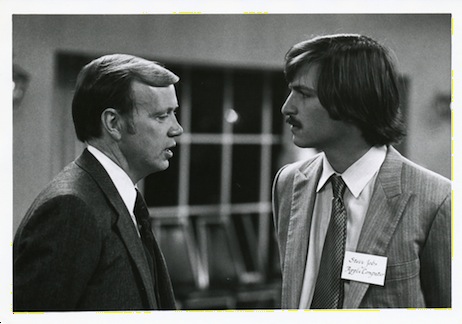
Regis McKenna (PR guru) and Steve Jobs (Apple)
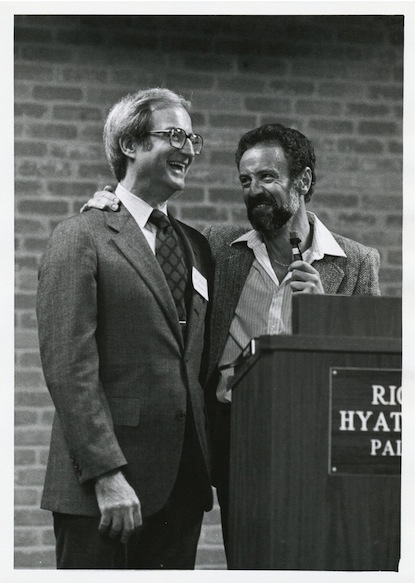
Ben Rosen and Andy Grove (Intel)
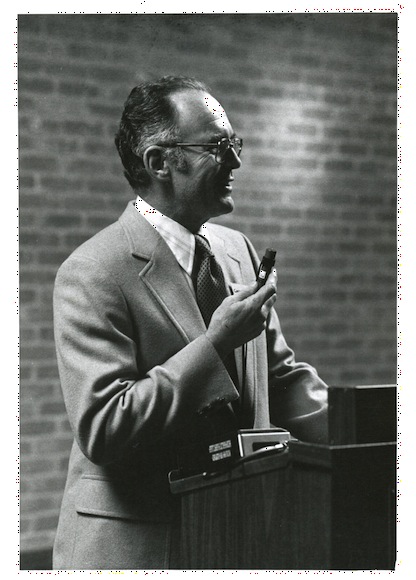
Gordon Moore (Intel)
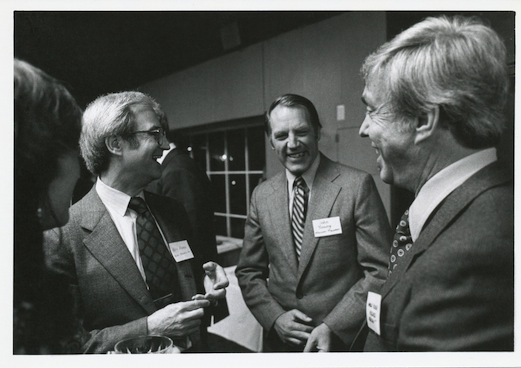
John Young (HP) surrounded by Rosens
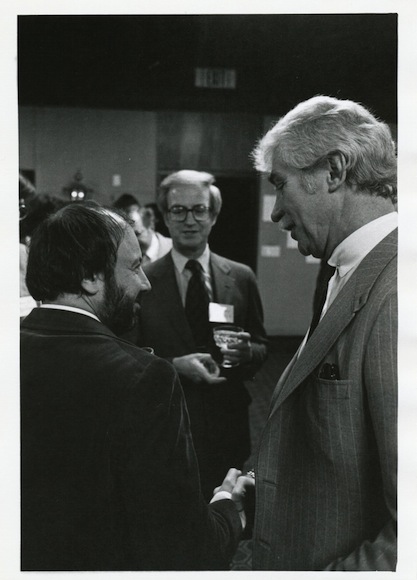
Jerry Sanders (AMD - right)
Electric vehicle update
“Your vehicle is ready to be shipped to you soon.” That’s the email I received today from Tesla Motors regarding the Roadster that that I've had on order for several years, and I can’t wait. In fact, I got so antsy waiting for it – it’s a year and a half late -- that I recently bought a Segway – the two-wheeled Human Transporter that was the most hyped product of its time. Introduced in 2002, the self-balancing Segway is an engineering tour de force, a truly remarkable feat of applying sophisticated technology to solving a problem. The problem, however, turned out to be one that few had. It reminded me of Amazon.com’s electronic reader, the Kindle – another example of technology searching for a problem.
My experience so far with the Segway has paralleled the disappointing response of the broader market. In the few weeks that I’ve owned it, I’ve been hard-pressed to find a useful application. It is, however, an amusement for outdoor parties in the summer, though I do get concerned about the adequacy of my insurance coverage when first-time users try it out, especially after they’ve had a libation or two.

Guest aboard the Segway
Oh, yes, Tesla has now engendered competition from two of the (formerly) Big Three, General Motors and Chrysler. They have both announced electric cars, but not all-electric (as is Tesla’s design). The newer offerings have a fully-charged battery range of 40 miles that can be extended to hundreds of miles by an onboard gasoline engine. Both all-electric and range-extender approaches have merit; actual experience in service will determine the better solution. One other difference: Tesla hasn’t asked the Washington for $25 billion, as have the Big Three, to support its effort. How last century not to ask for a government bailout!
Google Lunar X follow-up
My high hopes (Spin Me to the Moon) that my brother Harold and his Southern California Selene Group would win the $20 million first prize have been dashed. The team withdrew from the competition, even though they had such an incredibly clever design. The issue? It turns out that the prize’s sponsors had as a goal not an elegant and low-cost scientific mission to the moon, but rather an absurd goal of commercializing space – e.g., mining the moon, beaming power to the earth, and other such dubious ventures.
Harold decided there was no way he wanted to be involved in promoting a goal he doesn’t believe in, or, as he puts it, “an outrageously unrealistic version of space commercialization.”
Another poignant follow-up
Ten-year-old Eclipse Aviation, the pioneer of the very-light-jet industry, is going through significant growing pains. And then some. Ten years after founding the company, CEO Vern Raburn was forced out by the board. Not the first time a founder has been replaced, but no less sad when it happens, especially when it involves a friend of 35 years.
A note on philanthropy
Two related items caught my attention this week. Alberto Vilar, erstwhile technology investor and philanthropist, went on trial Monday on charges of defrauding his investors. Today the New York Sun ran a piece about a forthcoming biography ofMaimonides by Joel Kraemer. What’s the link between the two items?
Let’s start with Maimonides, the 12th century Jewish philosopher (and also doctor and rabbi), whose most famous work was hisGuide to the Perplexed. (Should be a good market today for a book with that title.) Among Maimonides’s interests was philanthropy. He wrote of the seven levels of virtue in charitable giving. They are, in ascending order of virtue:
7. The least virtuous, to give grudgingly.
6. Next, and more virtuous, to give less than one should, but graciously.
5. Next, to give what one should, but only after being asked.
4. Next, to give before being asked.
3. Next, to give without knowing who will receive the gift, though the recipient knows who you are.
2. Next, and almost the best, to give anonymously.
1. And finally, the most virtuous of all, to give anonymously, with the recipient not knowing who you are.
Now let’s switch to Mr. Vilar. His story as a most generous donor to opera and classical music organizations is well known. As is his running into financial difficulties after the tech bubble burst and becoming unable to fulfill many of the sizable pledges he had made during the salad days of tech investing. But what I found most interesting about his philanthropy was not just his passion for the arts, but also for personal recognition. Naming rights are now a well-established part of the charity game – he who gives the money gets the right to name the building/hall/room/seat/ashtray. But Alberto took it to a new level, at least in one case.
Some years ago, when he was negotiating funding for a new Met Opera production, he submitted an unusual request to then general manager Joe Volpe. Alberto wanted his name, as production funder, to be listed in the Playbill in type the same size as the composer’s, arguing that the importance of Alberto Vilar to the production was equal to that of Mozart.
Request denied.
Joe Volpe could handle Vilar, but I’m not sure what Maimonides would make of him. I do know, however, where Vilar would rank in the seven levels of virtuous giving.
Few donors today rank in Tier No. 1 of virtue – anonymous giver, and anonymous even to the recipient. Today’s eight- and nine-figure donors typically expect pretty prominent name recognition. But just today I learned that the principal donor to the new Frank Gehry hall being built for Miami Beach’s New World Symphony comes close. The $90 million lead gift for the $150 million campus has been donated anonymously. That would make Maimonides happy.
A day at Lime Rock
Every Labor Day weekend, Lime Rock race track in northwestern Connecticut hosts the Rolex Vintage Festival, a display of old and very old sports and racing cars, with a few other non-racing classics thrown in for good measure (e.g., , 1930 Pierce Arrows, postwar tailfin Cadillacs).
Two things struck me. First, most of the cars were sleek or sexy or elegant or outrageous or unique or inspiring or nostalgia-inspiring. Second, many of the people staring at the cars were none of the above.
First, the cars:








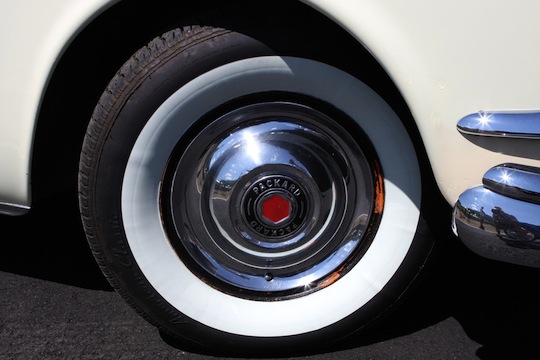



Second, (some of) the people :









